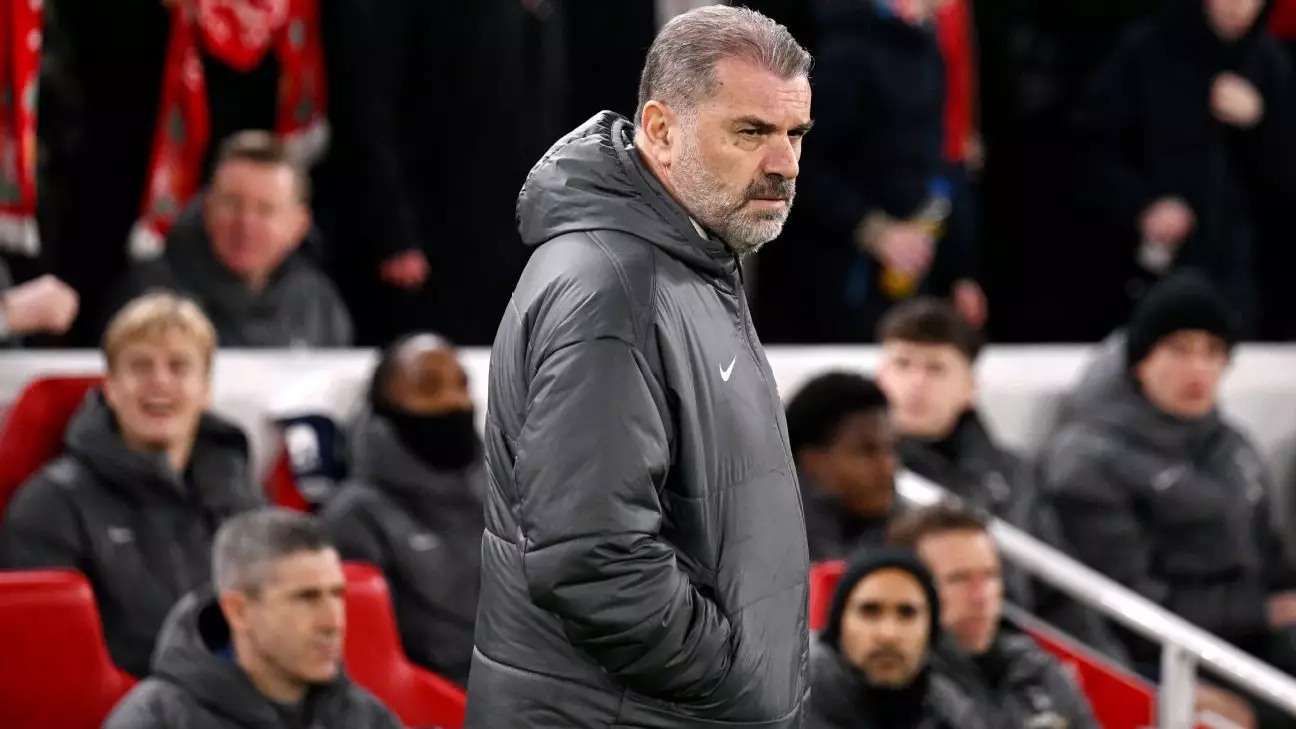Tottenham Hotspur, a club steeped in footballing tradition, finds itself enduring a particularly tumultuous period under the leadership of head coach Ange Postecoglou. Following an alarming 4-0 defeat to Liverpool in the Carabao Cup semifinal, criticism has been rampant from pundits, fans, and media alike. This loss, characterized by a glaring lack of offensive potency, has not only exposed the team’s frailties but has also ignited questions regarding the broader direction of the club and the coaching strategy in place.
The thumping defeat at Anfield came as a significant shock, particularly following Spurs’ seemingly favorable start with a 1-0 lead from the first leg. However, this momentum quickly dissipated as they failed to muster a single shot on target throughout the match. The inadequacies displayed triggered a wave of criticism, with former Spurs captain Jamie Redknapp describing the outcome as “horrendous”. Such assessments bring to the forefront the importance of both performance metrics in modern football and the psychological impact that high-stakes matches inflict on a squad.
Coach Postecoglou acknowledged the criticism levelled at the team but asserted that these setbacks do not encapsulate the character of the group. His words serve to remind us that while results are paramount, the basketball of player sentiment and morale cannot be overlooked.
Injuries have compounded the challenges encountered by Spurs. The latest casualty, Richarlison, embodies a growing collection of players sidelined due to various ailments, including calf, groin, and hamstring issues. This situation starkly highlights the fragile balance between player fitness and performance on the pitch—an aspect that can make or break a team’s season. Postecoglou’s transparent communication about player injuries reveals a coach cognizant not only of tactical needs but also the emotional dimensions of managing a team grappling with adversity.
With key players missing, the depth of Spurs’ squad is being heavily tested. Nevertheless, Postecoglou remains optimistic about their return in the near future, particularly with the added context of a crucial FA Cup fourth-round match against Aston Villa looming. His hope to see at least a few players back by the clash against Manchester United signifies a glimmer of positivity amid a challenging stretch.
As Spurs regroup and prepare for the upcoming FA Cup match, the focus shifts to performance improvement and tactical adjustments that could revitalize their campaign. Postecoglou emphasized the importance of character and resilience, urging his players to reflect their true potential and fight spirit. The FA Cup represents a vital opportunity for redemption and a possible pathway to silverware, something that the club has desperately yearned for since their last trophy in 2008.
The manager’s belief in his players is crucial at this juncture, as aligning team morale with strategic execution becomes imperative. The notion that they can still compete for titles, despite recent shortcomings, can foster a renewed sense of motivation that is essential for any squad steeped in high expectations.
Tottenham Hotspur finds itself in a period of self-reflection, motivating not only tactical changes but also requiring a psychological reset following a series of disappointing outcomes. The critique following the heavy defeat to Liverpool, while harsh, offers a necessary catalyst for growth and renewal within the squad. The performance in the FA Cup against Aston Villa will be pivotal—not just for securing progression in the tournament, but also for restoring confidence and belief in the team’s capabilities. As the season unfolds, the dual focus on tactical discipline and emotional resilience will undoubtedly define Postecoglou’s era at Spurs. The hope remains that this challenging chapter can metamorphose into a narrative of resilience and eventual success.

